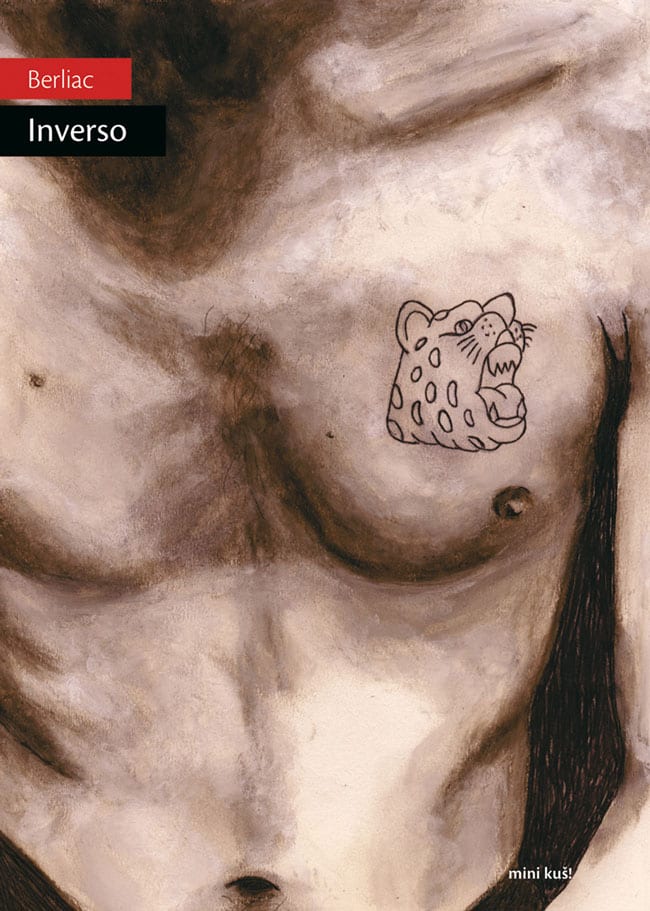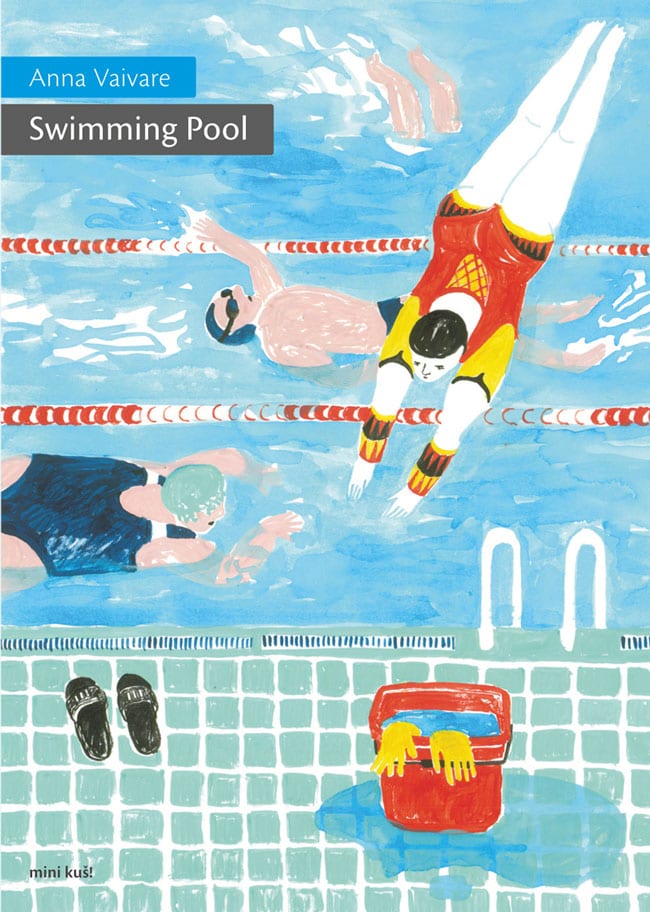Kuš! (pronounced "koosh"), the Latvian Comics anthology launched in 2007, recently sent me their eight most recent minicomics, half of which were released in late 2013, the rest earlier this year. Each 24-page mini is a solo effort from a different creator in their growing stable of Latvian and international artists. Each creator employs elements of fantasy or magical realism in his or her stories, with one piece being flat-out science fiction (albeit in a very whimsical fashion). Even the one comic that appears to be a straightforward, grounded-in-the-real-world story—Oskars Pavlovskis' Lucky—dips into the Twilight Zone before the final page. The comics and artists featured by Kuš! often work in an elliptical fashion; the stories revel in ambiguity, traffic in surreal imagery and storylines, and are frequently grounded in the conceptual rather than the concrete. Each mini has a brief, well-written synopsis on the back cover, which can help the uninitiated suss out some of the more abstract tales. They are all 4" x 6", in color, impeccably designed and produced, making them collectible little art objects.
This No Place to Stay by Michael Jordan (#18)
German artist Michael Jordan (unsurprisingly, not the basketball legend) offers up this brooding, surreal, "semi-fictional, semi-biographical" trip into Kafka-land, presenting at the outset a bearded traveler who finds himself at a café that suddenly pops up in an eerie mountainous landscape. He travels through his coffee cup (yes, you read that right) and into a hospital where, his arm suddenly in a sling, he awaits a diagnosis from doctors and nurses. They seem dubious about his chances, but one nurse has a mysterious message for him. This tale, which has the feel of a half-remembered fever dream, situates the reader inside the protagonist's troubled liminal state, leaving the story open to various interpretations. For me, Jordan renders all this weirdness so beguilingly I've reread it a half dozen times, at least. Sometimes the best mysteries are the ones that are left unsolved.
Inverso by Berliac (#19)
Inverso tells the tale of a zoologist who leaves his troubled primary relationship to go in search of a legendary jaguar in the Amazonian jungle, a jaguar that is invisible at night other than its spots. One native describes it as "like a hundred ghosts, staring at you." Berliac, a native Argentinean, renders this strikingly told tale with eerie, poetic and disturbing imagery, linking the zoologist’s search for the elusive cat with the slippery, sometimes destructive nature of relationships. The final image will haunt you.
Crater Lake by Jean de Wet (#20)
This is a wordless comic, a continuous panoramic sequence charting the trajectories of concurrent flights happening across the sky over a small village built on a volcanic crater. The first flight is that of a hang-glider who sets off on the first page; the other is what appears to be a meteor shower. South African artist de Wet limns the action in lightly stippled blue-lined drawings against a white background, capturing the various reactions (and non-reactions) by the village community below to the events above. It's a charmingly done work, with the juxtaposition of man-made flight and celestial phenomenon giving it a quietly poetic feel. The final reveal on the back cover made me smile.
Jungle Night by Renata Gąsiorowska (#21)
Poland's Renata Gąsiorowska has created a charming anthropomorphic world for this story about a teenaged girl-rabbit named Lili, who lives in a small mountain village that has an annual “Jungle Night” celebration. For the big event, the villagers honor their ancestors by spending the night in the jungle and sleeping in the trees—after much partying and drinking, of course. At the festivities with her friends, Lili begins to disassociate. She soon finds herself compelled to slip away, journeying off all alone, deep into the dark woods: “I slept in the trees and wore leaves on my head, just like my ancestors.” We know right from the outset that she was rescued days later, unconscious from hunger and exhaustion, with no one – least of all Lili herself – fully understanding her primal urge to truly connect with her ancestors, her roots. It’s a powerful little coming-of-age tale, beautifully disguised in fairy tale trappings.
Lucky by Oskars Pavlovskis (#22)
Lucky is a creepy-looking petty criminal who spends his day stealing parts from cars, assaulting and/or scamming innocent passers-by for money, and generally getting up to no good. Spending time with him is not a particularly pleasant experience, but Latvian artist Oskars Pavlovskis has a great underground comics style, and the twisty final sequence leaves us to decide for ourselves whether we are witnessing something truly uncanny, or if the entire story has been a back and forth between two sides of Lucky's twisted consciousness. The back cover recommends reading the story in a slight Eastern European accent, which I totally back up, one hundred percent.
Domino by Rūta & Anete Daubure (#23)
Domino tells the story of Robér, a magical little man in charge of keeping the world in balance. But even someone with such a huge responsibility has to take a day off sooner or later, which is the starting point for the trouble that ensues. Created by the Latvian sister team of Rūta & Anete Daubure, Domino is a whimsical, philosophical meditation on the nature of chance and our relationship to the unexpected, not unlike the territory that Lilli Carré often explores. Near the end of the story, Robér reminds us: “The accidents never end, they continue the same way days change into nights. We are all accidents, the games of them, interplays and continuations.” This could all have come across as perhaps a bit too twee, but the story's darker undercurrent, belied by its presentation in bright warm colors, totally makes it work.
Swimming Pool by Anna Vaivare (#24)
Another of the artists from the home base of Latvia, Anna Vaivare, has a dreamy style that is a mixture of gouache and watercolor perfect for this story, a first-person account of a janitor who takes us through her workday at a public swimming pool. The woman toils away her days, cleaning and polishing, all the while watching people frolicking and exercising in the water. Once a circus performer, she now enjoys her anonymity: "I like being invisible. Observing people while blending with the room." The conclusion is perhaps a bit predictable, but Vaivare's slightly naïve, shimmering visuals are a complete delight to the eye, making this one of the strongest of this batch, and along with Jungle Night, the most accessible for the general reader.
Magnetism by Roope Eronen (#25)
Finland’s Roope Eronen's comics have a simple, brightly colored, childlike awkwardness that I always find difficult to resist. Magnetism tells the absurdist tale – set in the future - of a woman who is presented with the opportunity to escape our turbulent planet of problems by swallowing a special magnet, a magnet that will transport her far away to another planet. Despite the many risks involved, she agrees to do it, but there are unexpected problems. This is the only outright comedy of the minis discussed here, with even a little bit of slapstick thrown into the mix. It's silly fun.
It strikes me that had these eight comics been bound together in one book it would have made for an eclectic yet cohesive anthology of international comics. But doing so would mean forgoing the pleasures of holding, reading, rereading, interpreting, and admiring these unique, colorful little booklets themselves, which represent some of the best of what the minis medium has to offer right now. Explore the Kuš! minicomics line and let a little of their magic rub off on you.














